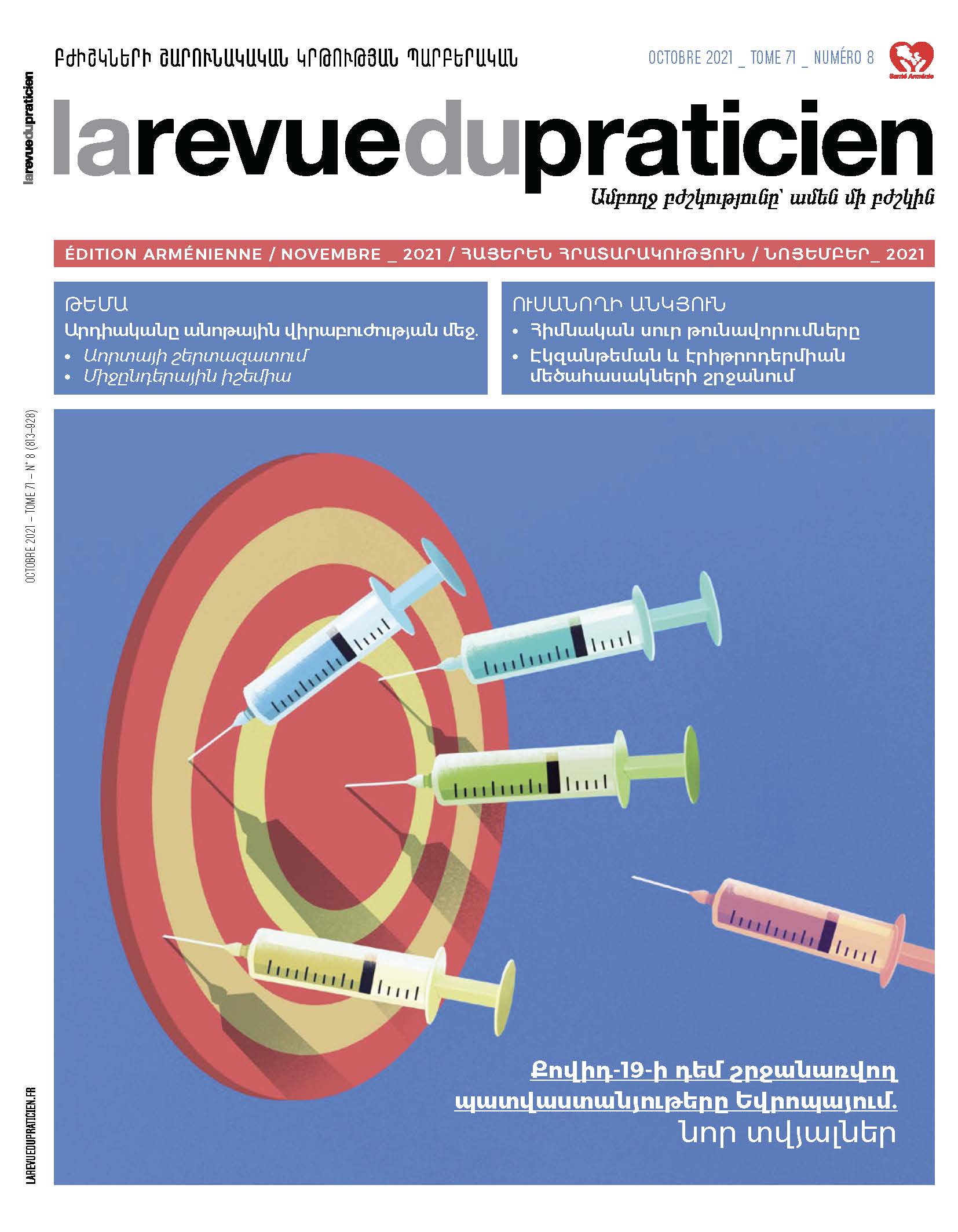Ամփոփագիր
Զարկերակային սուր միջընդերային իշեմիան (ՍՄԻ) կամ սուր աղիքային իշեմիան անոթների և աղիների՝ անհետաձգելի բուժօգնություն պահանջող վիճակ է։ Վաղ բուժման բացակայության դեպքում այն խորանում է մինչև աղիների ինֆարկտ, որը բնութագրվում է աղիների պատերի անհետադարձելի մեռուկացմամբ և անխուսափելիորեն հանգեցնում է մահվան՝ բազմաօրգանային անբավարարության պատճառով։ Այս ծայրահեղ անբարենպաստ կանխատեսումը ստիպում է քննարկել այդ հիվանդության հնարավորությունը նույնիսկ այնպիսի ոչ ակներև նշանների դեպքում, ինչպիսին որովայնային մեկուսացված ցավն է։ Ուշացած ախտորոշումը հայտնաբերում է միայն արդեն շատ խորացած ձևերը, որոնց դեպքում մահացությունը մեծ է կամ պահանջվում է աղիների մեծածավալ հատում, որն էլ կարճ աղու՝ գործառութային և սննդային ծանր հետևանքներով համախտանիշների մեծ մասի պատճառն է։ Առաջընթացը, որ վերջերս գրանցվել է այս՝ դեռևս հիմնականում անհայտ հիվանդության բուժման գործում, հիմնված է վաղ բուժման պարագայում իշեմիայի հետադարձելիության հիմնարար հայեցակարգի և միջբնագավառային կազմակերպման վրա։ Իրոք, ՍՄԻ-ի ախտորոշումն ու բուժումը պահանջում է բազմաթիվ մասնագետների՝ ընտանեկան բժիշկների, շտապօգնության բժիշկների, գաստրոէնտերոլոգների, ռենտգենաբանների, անոթային և մարսողական վիրաբույժների, անզգայացնող-վերակենդանացնողների, սրտաբանների, կենսաբան բժիշկների (արյունաբանություն/արյունականգ) համակարգված աշխատանք, որը հիվանդի անցած ճանապարհի (ախտորոշումից մինչև սննդակարգային օգնության մասնագիտացված կենտրոններում հսկողություն, ներառյալ՝ սուր փուլում ինտերվենցիոն բուժում) բարելավման բանալին է։ Կաթվածի կենտրոնների (stroke centers)` ինտենսիվ բուժօգնության նյարդա-անոթային կամ սրտաբանական բաժանմունքների մոդելով ստեղծված աղե-անոթային արագ արձագանքման կառույցն (SURVI) առաջարկում է այդ ճանապարհի յուրաքանչյուր փուլին հարմարեցված բուժում և այսուհետ խոստումնալից հեռանկար է մատուցում:
Résumé
L’ischémie mésentérique aiguë (IMA) artérielle, ou ischémie intestinale aiguë, est une urgence vasculaire et intestinale. En l’absence de prise en charge précoce, l’ischémie évolue vers l’infarctus intestinal, caractérisé par une nécrose transmurale irréversible, conduisant inexorablement au décès par défaillance multiviscérale. Du fait de ce pronostic extrêmement défavorable, il est donc important de toujours savoir évoquer cette pathologie, même devant des signes frustes, comme une douleur abdominale isolée. Le retard diagnostique conduit à identifier uniquement les formes encore trop tardives, associées à une mortalité élevée ou nécessitant une résection intestinale étendue, à l’origine de la majorité des syndromes de grêle court, dont les conséquences fonctionnelles et nutritionnelles sont lourdes. Les progrès récents réalisés dans le traitement de cette pathologie encore largement méconnue s’appuient sur un concept fondamental, la réversibilité de l’ischémie lorsqu’elle est prise en charge précocement, et sur une organisation multidisciplinaire. En effet, le diagnostic et le traitement de l’IMA impliquent la coordination de nombreux acteurs : médecins généralistes, urgentistes, gastroentérologues, radiologues, chirurgiens vasculaires et digestifs, anesthésistes-réanimateurs, cardiologues, médecins biologistes (hématologie/hémostase). Cette coordination multidisciplinaire est la clé de l’amélioration du parcours des patients, du diagnostic au suivi dans des centres spécialisés d’assistance nutritive, en passant par le traitement interventionnel à la phase aiguë. Sur le modèle des stroke centers – unités de soins intensifs neurovasculaires ou cardiologiques –, la création de Structure d’URgences Vasculaires Intestinales (SURVI) permet de proposer un traitement adapté à chaque étape du parcours de ces patients, et offre désormais une perspective prometteuse.
Abstract
Acute mesenteric ischemia (AMI) is a severe vascular and intestinal emergency, most commonly related to the occlusion (mesenteric occlusive disease or emboli) of the superior mesenteric artery (SMA). Such as myocardial infarction or stroke, SMA occlusion is responsible of an intestinal infarction. In case of an early revascularization of the SMA, AMI can be reversible with no need for bowel resection. However, when left untreated, AMI fatally leads to irreversible intestinal necrosis and death following multiple organ failure. Considering its poor prognosis, AMI might be systematically suspected in case of a sudden, unusual and intense abdominal pain. Because AMI has a nonspecific clinical presentation, delayed diagnosis are frequent and unfortunately associated with poor outcomes. Therefore, general and emergency doctors, along with gastroenterologists, have a key role to play in the recognition of early AMI. In any case of clinically suspected AMI, an abdominal computed tomography angiogram might be urgently performed. Chronic mesenteric ischemia can also be revealed by postprandial abdominal pain associated with food fear and weight loss. In recent years, there has been a major improvement in the treatment of AMI following the creation of a French intestinal stroke center, gathering the expertise of specialized gastroentorologists, vascular and digestive surgeons, radiologists and intensivists. A multimodal and multidisciplinary approach combining the use of a systematic medical protocol, early revascularization of viable bowel and resection of non viable bowel when needed, has dramatically improved the prognosis of AMI, with current survival rates of 80 % and bowel resection being avoided in nearly two thirds of patients.
